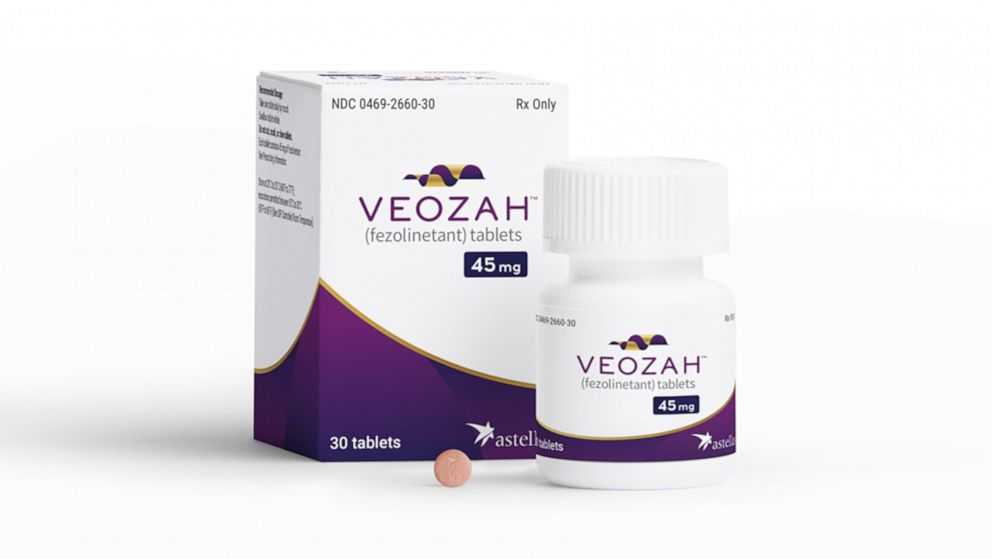Women have suffered for centuries with hot flashes, one of the most common symptoms of menopause, without many treatment options.
Now, the U.S. Food and Drug Administration has approved a first-of-its-kind drug, fezolinetant, sold under the brand name Veozah, to treat moderate to severe hot flashes during menopause.
The drug, a pill taken once a day, is hormone-free, which makes it promising for women who cannot take hormone treatment because of other underlying health concerns, such as a prior history of strokes, heart attacks or blood clots.
According to the FDA, the drug works by targeting the brain’s temperature control center to decrease both the frequency and intensity of hot flashes in women.
Prior to the FDA’s approval of fezolinetant, the main treatment options for hot flashes related to menopause were hormone replacement therapy (HRT) and some types of antidepressants.
“Hot flashes as a result of menopause can be a serious physical burden on women and impact their quality of life,” Dr. Janet Maynard, director of the Office of Rare Diseases, Pediatrics, Urologic and Reproductive Medicine, in the FDA’s Center for Drug Evaluation and Research, said in a statement. “The introduction of a new molecule to treat moderate to severe menopausal hot flashes will provide an additional safe and effective treatment option for women.”

Veozah is a once-a-day pill to treat moderate to severe hot flashes during menopause.
Astellas Pharma
Menopause is the point 12 months after a woman’s last and final period. The transition to menopause, also known as perimenopause, can take place over the course of several years, which is also how long women can suffer symptoms like hot flashes, according to the National Institutes of Health.
Menopause symptoms include everything from the well-known hot flashes and night sweats to the lesser-known and discussed symptoms like anxiety, vaginal dryness, painful intercourse, decrease in sexual function, insomnia and joint pain. The age that a woman goes through menopause can be impacted by factors like genetics, autoimmune conditions, trauma to the ovaries and toxic exposures like chemotherapy and radiation.
Most women experience the menopausal transition between the ages of 45 and 55, according to the NIH.
About 5% of women naturally go through early menopause between ages 40 and 45, according to the U.S. Office on Women’s Health.
Marci English, vice president and head of biopharma development at Astellas Pharma, which makes Veozah, said it was a priority for the company to offer a non-hormonal therapy to help women as they may experience several years of symptoms.
“One part when we talk about menopause I think is so overlooked … the menopause transition is seven years on average. If we look at women overall, 60 to 80% of women are going to experience hot flashes during the menopause transition,” English told ABC News. “We also know that some women, even after menopause in that postmenopausal period, the experience hot flashes up to 10 years. It can actually ebb and flow and it can last quite a long time.”
She continued, “I think what’s really important for people to understand is that this is a non-hormonal therapy, it is a first-in-class therapy, and this offers the choice for women.”
Dr. Jessica Shepherd, a board-certified OBGYN and chief medical officer for Verywell Health, told ABC News she thinks the FDA approval of fezolinetant could be “revolutionary” in the menopause landscape.
In clinical trials, researchers found that fezolinetant has decreased hot flashes by more than 50% in most women studied.
Patients who take Veozah will need to get routine bloodwork every three months for the first nine months of treatment, and those with severe liver damage and kidney damage should not take the drug.
The most common side effects of Veozah include abdominal pain, diarrhea, insomnia, back pain, liver damage and hot flush, according to the FDA.
Astellas Pharma tells ABC News that the drug should be available in pharmacies within three weeks.
The company said it will cost $550 for a 30-day supply, but cautioned that this is the price wholesalers will pay, and is subject to further pricing concessions. This won’t be the ultimate price for consumers, particularly those with insurance.
Amanda Kravitz, MD, is a resident physician in pediatrics and a member of the ABC News Medical Unit.

